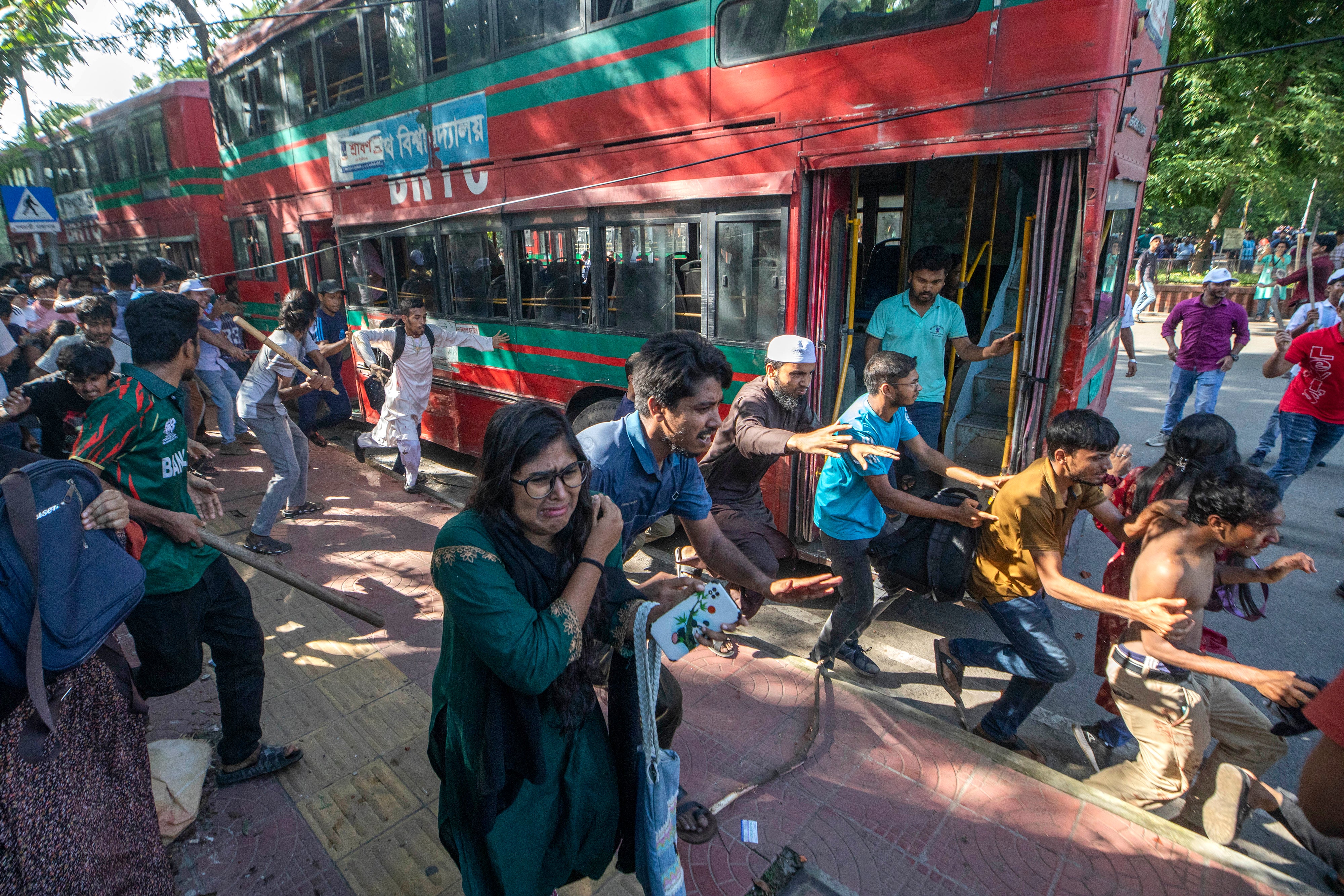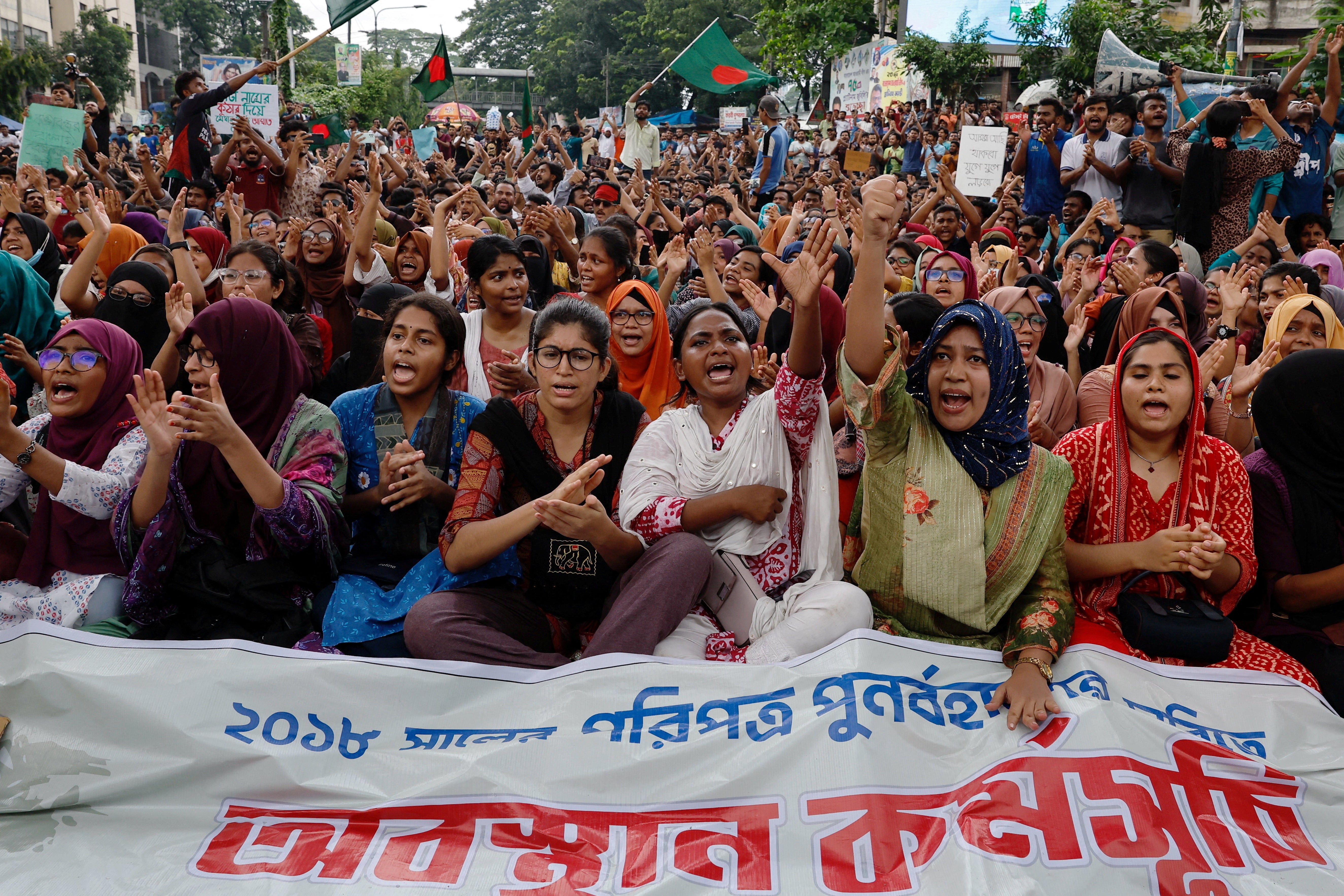Six killed as protests over jobs quota turn violent in Bangladesh
Students vow to continue agitation against 30 per cent reservation in government jobs for kin of 1971 war heroes

Your support helps us to tell the story
From reproductive rights to climate change to Big Tech, The Independent is on the ground when the story is developing. Whether it's investigating the financials of Elon Musk's pro-Trump PAC or producing our latest documentary, 'The A Word', which shines a light on the American women fighting for reproductive rights, we know how important it is to parse out the facts from the messaging.
At such a critical moment in US history, we need reporters on the ground. Your donation allows us to keep sending journalists to speak to both sides of the story.
The Independent is trusted by Americans across the entire political spectrum. And unlike many other quality news outlets, we choose not to lock Americans out of our reporting and analysis with paywalls. We believe quality journalism should be available to everyone, paid for by those who can afford it.
Your support makes all the difference.Six people have been killed in the ongoing unrest in Bangladesh over government job reservations, prompting authorities to shut down all universities in the country indefinitely.
Hundreds of people have sustained injuries in the protests which turned violent after demonstrators clashed with police and pro-government agitators this week. Three of the dead have been identified as students aged between 22 and 32.
They have been protesting against a 30 per cent reservation in government jobs for family members of freedom fighters from the 1971 War of Independence. The quota system also reserves jobs for women, disabled people and ethnic minority groups.
The policy has angered students suffering from high unemployment in a country where some 32 million young people are not in work or education. Bangladesh has a total population of 170 million.
The protests escalated after prime minister Sheikh Hasina refused to address the demands of the students, citing ongoing court proceedings, and labelled those opposing the quota system as "razakar", or volunteer, a term used for those who allegedly collaborated with the Pakistani army during the 1971 war.

The demonstrators claimed the prime minister’s statement incited her party's student wing — Bangladesh Chhatra League, or BCL — to attack thousands of people rallying against the quota system.
The protests are the first major challenge to Ms Hasina since she secured a fourth consecutive term early this year in an election boycotted by the opposition parties. Her government has a track record of deploying brute force against critics to throttle dissent.
The government has deployed riot police along with the Border Guard Bangladesh paramilitary force across university campuses to maintain law and order.
The protesters have been demanding an end to the quota system, arguing that people should be selected for the sought-after government jobs based on merit.
"We were protesting peacefully until we were attacked by the BCL goons. It is our right to continue protesting, it is embedded in the history of this country and we shall continue to do so for our right," a Dhaka university student who did not want to be named for fear of persecution told The Independent.
On Tuesday, the University Grants Commission ordered all universities to shut down and instructed students to vacate the campuses immediately “to protect the students”.
High schools, colleges and other educational institutions were also shut.

Police arrested seven activists, including a former leader of the Bangladesh Nationalist Party’s student wing, during a raid at the main opposition party’s headquarters in Dhaka.
"The ruling party members are targeting non-protesting students inside the campus as well. Men, women, anyone who refuses to side with the government quota is being assaulted," Rubina Khatun, a student at Dhaka University, told The Independent.
She said the students have been given time till 6pm today to vacate the university premises but some have decided to stay back, defying the order. "This puts us in so much danger. There is violence everywhere, how would we go home," she said.
Police fired rubber bullets and tear gas to disperse the protesters as at least two buses were set ablaze amid reports of sporadic clashes across the country.
Police are marching on the city streets to thwart any attempts of demonstrations. #WhatsHappeninginBangladesh #QuotaReformProtest pic.twitter.com/r119ZjQDGo
— MUKTADIR rashid ROMEO (@muktadirnewage) July 17, 2024
"We have no issue with them protesting against the quota. However, if they engage in vandalism or destructive activities, under anyone's influence or leadership, we will not spare them," said home minister Asaduzzaman Khan. "Wherever there is vandalism, killing, or bloodshed, law enforcement will do their duties."
Nahid Islam, a coordinator of the protests, said students will hold processions on Wednesday carrying coffins in solidarity with those who lost their lives. The paramilitary paraded through the streets of Dhaka and other big cities as stray protests continued at some universities.
The quota system was suspended in 2018, ending similar protests against it. However, a high court last month asked for the 30 per cent quota for descendants of freedom fighters to be restored.
The supreme court last week stayed the high court’s order for four weeks and the country’s chief justice asked the student protesters to return to their classes.
Join our commenting forum
Join thought-provoking conversations, follow other Independent readers and see their replies
Comments